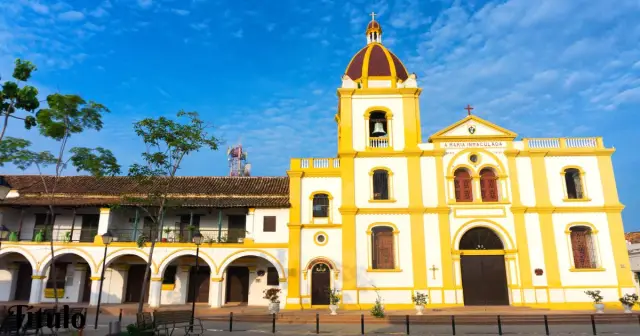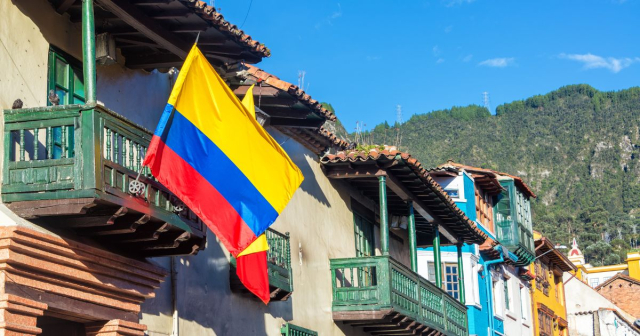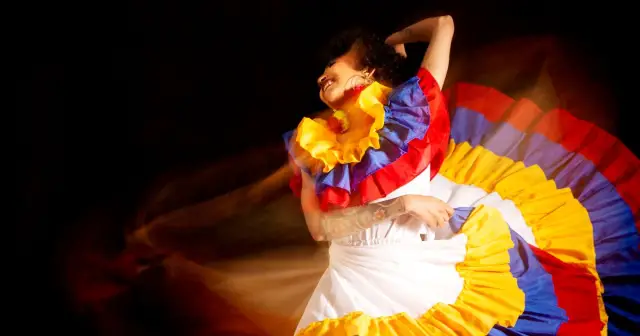The year 2025 brings important dates for Colombians. Holidays and celebrations reflect the country's cultural diversity and traditions. From Holy Week to patriotic events, each date has a special meaning. These festivities allow for family enjoyment and strengthen national identity.
National Holidays in Colombia 2025
In Colombia, the 2025 national holidays are moments of unity and celebration, combining religious, cultural, and patriotic traditions. Each holiday has its own meaning and its own way of commemorating it in different regions of the country.
New Year and Three Kings Day
The festivities begin on January 1st with the New Year. This day celebrates everything related to renewed promises and family celebrations. A feast is usually held, where traditional dishes are shared and wishes for prosperity are offered for the coming year.
New Year's Day Traditions
- Use of 12 grapes to make wishes, one for each stroke of midnight.
- Light candles of different colors to attract different energies.
- Perform a deep cleaning of the house to welcome the new year with good energy.
Three Kings Day Celebrations
January 6th is Three Kings Day, a tradition that involves children and is sustained by the expectation of gifts. On this day, activities such as preparing Rosca de Reyes (Rosca de Reyes), a sweet, circular bread shared with family and friends, take place.
Holy Week in Colombia
Holy Week is celebrated during the month of April, especially from the 13th to the 20th, marked by a series of religious ceremonies that attract many devotees. The tradition is especially strong in cities like Popayán and Bogotá, where processions and symbolic events are held.

Holy Thursday and Good Friday
Holy Thursday commemorates Jesus' Last Supper with his apostles. On this day, churches hold Masses and adoration of the Blessed Sacrament. Good Friday is an atmosphere of reflection and mourning, with the reenactment of the Passion of Christ.
Palm Sunday and Easter Sunday
Palm Sunday marks the beginning of Holy Week, commemorating Jesus' triumphant entry into Jerusalem. In churches, worshippers carry palm branches to be blessed. Finally, Easter Sunday is a day of joy, celebrating Christ's resurrection with Eucharist and family festivities.
Labor Day and Labor Celebrations
May 1st, Labor Day, is a holiday dedicated to honoring workers. On this day, marches and protest activities take place in various cities across the country. Colombians commemorate the importance of decent work and respect for labor rights.
Patriotic and Independence Dates
Patriotic dates are fundamental to building national identity. Celebrating these moments strengthens the sense of belonging and honors the struggle for freedom in Colombia.

Colombian Independence Day
July 20th marks Colombia's independence, marking a pivotal moment in the country's history. This historic event commemorates the 1810 Declaration of Independence, which laid the foundation for national autonomy. On this day, Colombians celebrate with various civic and cultural activities.
Events in Bogotá and other cities
- In Bogotá, parades are held with the participation of troops and folklore groups that represent the country's rich culture.
- The main squares become venues for concerts and artistic performances, promoting local talent.
- In cities like Medellín and Cali, celebrations include fireworks and culinary events that highlight culinary diversity.
Battle of Boyacá
On August 7, Colombia commemorates the Battle of Boyacá, one of the most significant victories in the struggle for independence. This historic event symbolizes the unity and commitment of the people in their quest for freedom.
Commemorations in Boyacá
- Boyacá, the site of the celebrations, organizes liturgical events that pay tribute to the heroes of independence.
- Battle reenactments allow attendees to relive the decisive confrontation that changed the course of the country.
- Fairs and exhibitions are held that highlight Boyacá culture, promoting the use of local products.
Cartagena's Independence Day
November 11th marks the independence of Cartagena, an event that took place in 1821. This city, famous for its history and colonial architecture, fervently celebrates its autonomy.
Activities on this holiday include parades, dances, and cultural events that highlight the diversity of the Caribbean region. Cartagena residents express their pride through artistic displays that revive the history of their struggle for freedom.
Important Religious Celebrations
Religious holidays in Colombia are an essential part of the national culture. They are celebrated with fervor and enthusiasm, providing devotees with an opportunity to strengthen their faith and unite with their communities.
Saint Joseph's Day
Saint Joseph's Day, celebrated on March 19, holds profound significance for the faithful across the country. This day is dedicated to honoring the adoptive father of Jesus and his role in the Holy Family. In several cities, special Masses and community activities are held in his honor.
Festivities in honor of Saint Joseph
- During the day, churches organize early morning and late afternoon Masses, which bring together friends and family.
- In many places, it is common for devotees to perform novenas and prayers in memory of Saint Joseph.
- Communities also often hold fairs and cultural activities, where typical foods and local customs are shared.
Corpus Christi and Sacred Heart of Jesus
These festivities are celebrated on variable dates and are a religious expression that invites reflection and family unity. They attract numerous believers who actively participate in the ceremonies.
Ceremonies in major cities
- In cities like Bogotá, Medellín, and Cali, celebrations may include processions and special Masses, where consecrated hosts are displayed.
- In several localities, religious events highlighting the importance of the Eucharist are held, and festive decorations are used in churches.
- Families take advantage of these days to gather, reflect on their faith, and share spiritual moments.
Day of the Immaculate Conception
The Feast of the Immaculate Conception, celebrated on December 8, is another significant holiday in the Colombian religious calendar. It honors the Virgin Mary for her conception without original sin, demonstrating devotion to the Mother of Jesus.
The celebrations are often colorful and full of fervor. They include Masses and community gatherings that highlight the fundamental role of the Virgin Mary in Christian life.
Cultural Festivals and Columbus Days
Cultural festivals in Colombia allow us to celebrate the diversity and richness of its traditions. These days are ideal times to recognize the roots and customs that have shaped the country.
Day of the Race and Cultural Diversity
Columbus Day, celebrated on October 12, is one of the most emblematic holidays in Colombia. This day seeks to pay tribute to the blending of cultures that occurred following the encounter between Indigenous peoples and European settlers. Through various activities, the importance of cultural diversity in the country is emphasized.
Celebrations in Colombian cities
In cities like Bogotá, Medellín, and Cali, parades, fairs, and exhibitions are held featuring traditional dances, crafts, and regional foods. In Bogotá, for example, events are held in Simón Bolívar Park, where indigenous communities showcase their traditions through artistic performances. In Medellín, cultural fairs are held that highlight the richness of the different ethnic groups that inhabit Colombia.
All Hallows
All Saints' Day, celebrated on November 1st, is another significant holiday. On this date, all the saints of the Church are remembered, as well as those loved ones who have passed away. This celebration is intertwined with popular traditions, especially in regions like Boyacá and Santander, where families gather to honor the memory of their deceased.
In many communities, offerings and masses are common, in an atmosphere of respect and reflection. Tables are filled with traditional foods and sweets, creating a space for connection between generations. In some parts of the country, artistic displays also include activities such as the creation of altars and parades of groups, which further enrich the celebration.
Days with long weekends
Long weekends are eagerly awaited by many Colombians, as they offer an opportunity to enjoy extended breaks and recreational activities. In 2025, there are several opportunities to take advantage of these days off.
Importance of Holiday Bridges
Long weekends are crucial in Colombian culture. They allow people to disconnect from work and strengthen family and social relationships. These breaks not only benefit personal well-being but also have a positive impact on the local economy, generally resulting in an increase in domestic tourism and consumption across various sectors.
The celebrations and activities held during these days extend the opportunity to enjoy the splendid landscapes and cultural events the country has to offer. They also benefit the hotel and restaurant industry, which receives a greater influx of visitors during these dates.
Long weekends in June, August and November
The 2025 calendar includes several particularly significant long weekends in the months of June, August, and November. These months are ideal for planning vacations or family getaways.
Bridges in June
June features two important holidays. On Monday, June 2nd, we celebrate Ascension Day, which, falling on a Monday, creates a long weekend holiday that many take advantage of to get out of the city. The month also features the Feast of the Sacred Heart of Jesus on June 30th, providing a second opportunity for rest.
Bridges in August
The month of August features Independence Day, celebrated on July 20th. Although this date is not postponed, August 7th, commemorating the Battle of Boyacá, falls on a Monday, providing a valuable holiday weekend. This commemoration offers an opportunity to reflect on national history and celebrate with various cultural activities.
Bridges in November
In November, there are several public holidays that also allow for long weekends. All Saints' Day is celebrated on Monday the 3rd, creating a long weekend that many take advantage of to travel. Also on November 17th, Cartagena's Independence Day is celebrated, commemorating the independence of this important Caribbean city.
In 2025, long weekends are an excellent opportunity to celebrate, relax, and enjoy the traditions that are part of Colombia's cultural richness. Each of these days offers the opportunity to connect with the country's history and identity, while also allowing us to enjoy meaningful moments with loved ones.
Special Days and Commemorations
In Colombia, special days and commemorations are occasions to reflect and celebrate important aspects of social and cultural life. These days promote inclusion, awareness, and recognition of diverse realities in the country.
Father's Day in Colombia
This year, Father's Day is celebrated on June 16th. It's a special day to honor the father figure and all the men who play a significant role in raising and educating children. Families often gather to celebrate with meals, gifts, and various activities.
- Children make gestures of gratitude, such as giving personalized cards or organizing surprises.
- In many homes, the father's favorite dishes are prepared, sometimes including a roast or a special dinner.
- Some outdoor activities, such as walks or picnics, are common to make this day a memorable experience.
International Down Syndrome Day
March 21st is International Down Syndrome Day, which aims to raise awareness about this disorder. In Colombia, various organizations and communities carry out activities to promote the inclusion of people with this condition in society.
- Educational events and workshops are organized to educate people about the rights and capabilities of people with Down syndrome.
- Social media is filled with messages of support and relevant information to raise awareness.
- Some communities hold marches and recreational activities to celebrate diversity and acceptance.
Important Awareness Dates
There are several days that seek to raise awareness about social, environmental, and health issues. These dates are commemorated throughout the year and connect with the community on different levels.
- April 2nd is World Autism Awareness Day, creating spaces for dialogue and reflection on the importance of inclusion and respect for people with autism.
- December 1st is World AIDS Day, a day in which prevention and education campaigns about the disease and HIV are held.
- October 10, World Mental Health Day, focuses on the importance of caring for the emotional and mental well-being of Colombians.
Economic and Tourism Impact of Holidays
Holidays in Colombia not only offer moments of relaxation and celebration, but also have a significant impact on the country's economy, especially in the tourism and commercial sectors.
Benefits for Domestic Tourism
Domestic tourism during the holidays represents a vital source of income for many regions. Holidays such as Easter and Independence Day attract local visitors who want to experience cultural traditions and unique events. Cities that benefit most from this influx of tourism include:
- Cartagena: Its historic architecture and beaches make it a popular holiday destination.
- Medellín: Known for its fairs and festivals, it attracts thousands of tourists during days like the Flower Fair.
- Bogotá: The capital is filled with cultural and culinary activities, attracting both residents and visitors.
During the holiday months, hotel occupancy increases significantly, as does the demand for tourism services, including local guides and transportation. This increase directly contributes to the economy of the areas involved.
Impact on Local Commerce
The holidays in Colombia also have a positive impact on local commerce. During these days, sales of products and services increase in various industries. Among the most benefited sectors are:
- Restaurants: An increase in customer traffic generates greater revenue for the food service sector.
- Souvenir and craft shops: Buying typical and handcrafted products is common among tourists.
- Events and shows: Cultural activities and festivals, which are common on holidays, generate additional income for venues and organizers.
Celebrating holidays in Colombia not only fosters a greater sense of community, but is also essential to the economic well-being of many cities. With each holiday, we see a collective effort to boost economic development through culture and tourism.
Labor Aspects on Holidays
Holidays in Colombia are not only times of celebration, but also have important implications for the workplace. Labor laws establish certain regulations that protect workers' rights during these special days.
Labor Rights on Holidays
Workers have specific rights regarding public holidays. Colombian law guarantees that those who work on these days have access to certain benefits. Among the most notable rights are:
- Right to a day of rest without penalty if you do not work.
- Receiving additional pay, known as a "surcharge," when working on a holiday.
- Opportunity to enjoy additional permits as stipulated in the employment contract.
This regulatory framework seeks to ensure that workers enjoy a balance between their work obligations and their right to rest. Compliance with these regulations also depends on the good faith of employers when managing shifts and work activities.
Calculation of Additional Payment on Holidays
When an employee works on a holiday, the law establishes a corresponding surcharge. This surcharge is calculated based on the employee's regular salary. The additional amount compensates employees for working on a day normally designated as a holiday.
Specific Calculation
The additional pay for working on a holiday is equivalent to 75% of the regular daily wage. Based on the minimum wage set for 2025, which is approximately $1,423,500 Colombian pesos:
- The daily wage is calculated by dividing this amount by 30 days, which results in approximately $47,450.
- For each holiday worked, the surcharge is calculated as follows: $47,450 + (0.75 * $47,450) = $83,037.
This calculation ensures that workers receive fair compensation for their work on days that are culturally and socially significant. Employers must take this regulation into account to avoid labor disputes and ensure a fair working environment.
